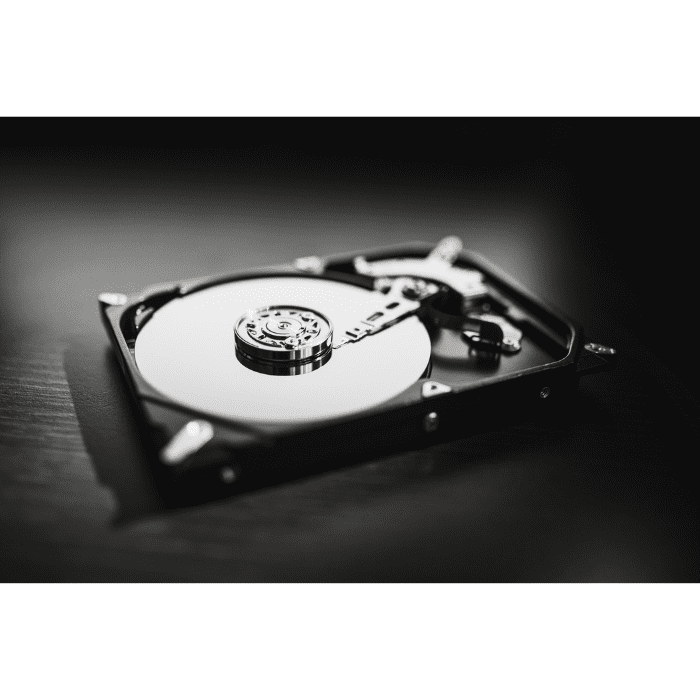Knowing exactly how long a disk will last is not an easy task, since there are several factors that can influence the durability of its parts.
Factors such as incorrect use, manufacturing defects and temperature, for example, can influence a longer or shorter lifespan of a disk.
Do you want to know the average lifespan of hard disks and what can shorten the lifespan of these devices? Then read the text below and find out all about it! Enjoy!

Does the disk have an expiration date?
Yes, contrary to what many people think, all disks available on the market have a shelf life.
It’s not possible to say exactly how long a disk will last, as various factors can shorten the lifespan of these devices.
However, with proper use and maintenance, you can increase the lifespan of your disk and keep your important files safe for a longer period of time.
What is the lifespan of a disk?
Disks last an average of 5 to 10 years. However, few devices make it that far without any problems.
Factors such as temperature, factory defects and even misuse of the device can affect this shelf life considerably.
How do I know how long the disk will last?
There are a number of signs that your disk may show as its useful life approaches its end. Being alert to these signs is essential so that you don’t get surprised and can buy another replacement hard disk before it’s too late.
Here are some of the signs that your disk’s lifespan is decreasing:
Strange noises
It’s very important to keep an eye on the sounds made by your own machine. In general, your computer shouldn’t make much noise, except for the cooler (the machine’s fan).
When disks reach the end of their life, it is common for them to make the famous “death clicks”, so keep an eye out for these sounds.
Corrupted data
Corrupted data for no apparent reason is one of the most classic signs that a disk is about to stop.
You may notice this problem when copying files from one directory to another on the same storage device.
So do some tests, such as saving new files and seeing if you don’t get any error messages when you access them later.
If this problem starts to become common, it’s best to save your essential files on another device just in case.
Delays in opening directories and files
A delay in opening directories and files is not necessarily a sign that your disk is about to stop, but it should always be watched carefully.
Often, it’s just a processing problem or excessive use of RAM.
However, when a simple, lightweight file takes a few minutes to load on your computer, this could be a bad sign for your disk.
In extreme cases, several minutes may not be enough to load a file or open a directory completely.
Another sign of this problem is an excessive delay in emptying the recycle bin.
Bad sectors
Another factor that can indicate that your disk’s useful life has come to an end is an excess of defective areas on the hard disk.
However, as these spaces are “masked” by the operating system, it is necessary to carry out a manual diagnosis to find out whether or not this problem is really happening.
To do this, use the shortcut “Windows Key” + “R” and run the command “diskmgmt.msc” on the screen that opens when you run the command.
After that, right-click on the hard disk drive you want to analyze and choose the “Properties” option.
In the window that opens, go to the “Tools” tab and click on the “Scan” button. Confirm the action and wait for Windows to scan for problems.
If Windows finds too many problems, especially too many bad sectors, start looking for another disk to replace.
Breaks and freezes
Finally, another sign that your disk is in trouble is if it constantly crashes or freezes.
When this happens, the first reaction is to figure out which programs were open, after all, it’s possible that the machine is simply overloaded.
However, if everything was in order and yet the crashes and freezes are constant, it’s quite possible that the problem is with the disk.
What can reduce disk life?
As we have seen, there are several factors that can shorten the life of a disk. Check them out to start avoiding them:
Turning the computer on or off many times
Turning your computer on and off often can damage a computer’s disk, as these are the moments when the part is most stressed and, over time and with extra friction, this can damage the disk platters, especially in cases of abrupt shutdown.
So if you’re going to be without using your computer for a long time, such as during a trip, for example, the best thing to do is turn it off.
However, if you are only going away for a few hours and will be using it the same day, put your computer on standby instead of turning it off.
Do not use a power strip or nobreak
Power surges can damage a wide variety of electronic devices and it’s no different when it comes to disks.
So always keep your computer connected to a power strip or nobreak. Although not guaranteed, this prevents power surges from damaging your device.
Obstructed air vents
If you have a desktop computer, make sure the air vents are not obstructed by any object, and if you have a laptop, avoid using it on cushions or fabrics.
Obstructing the air vents is very damaging for these devices, as it can cause overheating and consequently damage to the device.
Accumulated dust
Always keep your computer clean. Accumulated dust can damage various components and compromise your entire computer.
Therefore, the tip is to clean all the ports on your device whenever possible.
However, be careful: don’t use sharp objects, as they can damage your computer. Instead, use a brush to perform this maintenance.
Falls and impacts
Falls and any impact, no matter how minor, can cause a series of problems with the disk, such as loss of readability.
In serious cases, these devices can even become unusable.
To avoid this problem, it is best to always store these objects in compartments suitable for transportation.
Transport the laptop with power on
Finally, it’s very important that you never carry your laptop around turned on. Whenever you take it anywhere, keep it turned off.
That’s because when you carry your computer with the power on, you’ll cause the DISK to run while you rock it back and forth.
This increases the chances of damage to the device. So whenever you’re transporting your computer, turn it off.
What to do when it starts having problems?
When your disk starts having problems, it’s important to take precautions and transfer the most important files to another device.
After all, that famous soccer saying also applies when it comes to backups and disks: he who has one has none, he who has two has one, etc.
So at the first sign of trouble, take the necessary precautions and move your most sensitive files to another device before it’s too late.
Conclusion
As we have seen, the lifespan of disks is, on average, between 5 and 10 years. However, this lifespan can vary widely and it’s not possible to say exactly how long a disk will last.
“Death clicks”, a higher frequency of corrupted data, delays in opening directories and files, too many bad sectors, breaks and freezes are the most common signs that a disk’s useful life has come to an end.
It’s therefore worth knowing what the main factors are that can shorten a disk’s lifespan.
To remind you, these are: turning the computer on or off too often, not using a power strip or UPS, obstructing the air vents, dust accumulation, falls and impacts and carrying the laptop around.
If you avoid these practices, you can extend the life of your hard disk by a few years.
And if the problem has already arrived and you’ve lost some data, you can always count on Bot! We specialize in data recovery!
As well as a free quote, we guarantee free collection of your device by express delivery from any address in Portugal.


